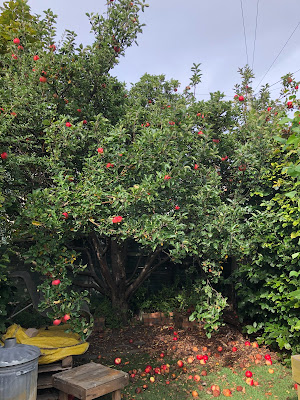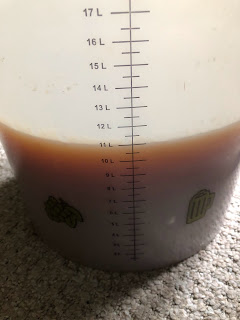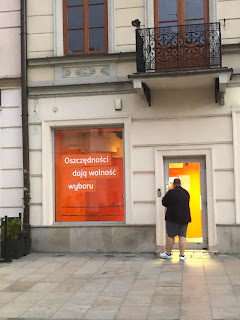The COVID pandemic is officially over, but as it happens, I now have COVID. That is, I have tested positive for COVID since Friday, and it's a real pain in the tuckus.
This fine word, by the way, is an anglicisation of the Yiddish "tuchus," which I probably heard in a 1980s Hollywood film rather than (as a Torontonian might expect) my parents' neighbourhood, where one is more likely to hear Russian or Hebrew, at least on the bus.
Or so I think. I have not actually been in my parents' neighbourhood since New Year's Day 2020.
The exact order if the set of circumstances that have led to my exile is a bit hazy now. A disease travelled out of China, and the Canadian government was very worried for the bad treatment of the Chinese by Canadians, but then a variation of the disease came out of the United Kingdom, so the Canadian government banned British flights between December 23 and January 7. Joyeux Noel!
Before that was a period where there weren't many flights from Britain anywhere--and while hiding in our homes and washing our groceries we hoped the atmosphere would profit from the break. The news out of Italy was terribly bad---although, when there were flights again, Benedict Ambrose and I had no trouble going there. It was before the vaccine, so all we had to do was not have a temperature. Going to Canada, once it lifted the anti-British ban, would have meant an expensive and possibly dangerous hotel quarantine. I seem to remember stories of forced van rides to undisclosed locations, bags of refuse, disgusting food, sexual assaults.
But life, especially expat life, got more difficult when there was a vaccine because Canadian families began to break up over the question of whether the vax was the best thing since sliced bread or the best thing since BEFORE sliced bread. It also meant, of course, that governments could decide to restrict travel (work, unemployment benefits, child visitation rights, etc.) only to people who had had the vaccine.
But some scientists and medical professionals were highly reluctant to take the vaccine. Some of them told my employer why, and occasionally I fixed their sentence structure and reduced the numbers of their exclamation points before we published their explanations. I also kept track of British COVID jab side effects reports, which made for gruesome reading.
It was almost, but not quite, illegal to tell people why other people were reluctant to take the vaccines, and my employer's readership skyrocketed because it was otherwise hard to find balanced reading. By balanced, I mean that most news websites told people to take the vaccines and our news website told them to not take the vaccines. If you read the government advice, and you read advice against the government advice, you read both sides of the story. That's what balanced means these days.
Naturally, working where I work, I did not take the vaccines.
(In Canada, a French-Canadian child told a talk show host that people like me should be reported to police. Another thought we should be deprived of this and that until we submitted.)
And I did not get sick. Oh, I had a bad tummy ache in August 2020, probably from an ice-cream sundae in rural Silesia, and I got the "super-cold" in April 2022, I think it was. That was pretty miserable, but I took a COVID test and COVID it was not.
So for most of the last 34 months I was healthy, happy, energetic, a danger to nobody, and I missed my family and friends back in Canada a lot.
(In case anyone has forgotten this already, until Saturday, October 1, 2022, unvaccinated Canadians could return to Canada from overseas--but would have to be in quarantine for 14 days and could not leave again.)
I missed my family and friends so much that when the Canadian truckers decided to protest Canadian COVID restrictions, I burst into tears. This will sound crazy if you read the Guardian instead of, you know, the Western Standard or the New York Times instead of the New York Post. However, I distinctly remember feeling that ordinary Canadian hockey dads, blue-collar, salt-of-the-earth, Tim-Horton's-coffee-drinking dads were going to set the country free so I could go home without being treated like a war criminal by airport staff and then--crucially--be permitted to leave the country again to rejoin my cancer-survivor husband.
This is not what happened, though. Instead the (government-subsidised) media turned on the Canadian hockey dads, and .... I don't want to live through that again, even in memory. However, even if the truckers failed, one Canadian dad did see an opportunity in the Freedom Convoy. Say hello, Canadian history, to Pierre Poilievre, the man whose total domination of the Conservative leadership elections led (can anyone doubt it?) to the end of the very probably illegal Canadian travel restrictions.
I waited for the pro-jab members of my family to come and see me, and eventually my elderly parents booked a tour of the Highlands and informed me that they would be along on October 1 to stay for six nights. I was terribly happy; Benedict Ambrose painted the master bedroom; we saved bottles of elderflower champagne for their delectation.
A week before, however, Benedict Ambrose felt like he had the flu and spent two days in bed. He was out of it again on Monday, but then I began to feel like I had the flu. I went to bed myself and stayed there until Thursday, when I felt well enough to do an honest day's work. However, B.A. and I decided that--just in case--we had better take COVID tests before Mum and Dad turned up to stay with us for a week. So appalled was I by the possibility that I might not be able to see my parents, I burst into frightened tears even before taking the test.
After taking the test, I was disconsolate.
So to wrap up this tale of terrible timing, we found Mum and Dad an AirBnB within walking distance of our home, and we bought a pile of £2 Tesco COVID tests so we can test ourselves every day. We meet my parents outside, keeping six feet apart, usually wearing masks. I feel utterly wretched leaving the house because, for the first time in 34 months, I am actually COVID-positive and, therefore, presumably dangerous to others. Naturally, B.A. and I stayed home from Mass.
I am not, however, particularly sick. Currently I cough from time to time, and I tire easily. Let's hope I'm over the worst. I chug Vitamin C, Vitamin D3, and zinc; I do not happen to have the exotic anti-malarial on hand.
And I feel happy because I have actually seen my Mum and Dad in person for two days in a row and because, no matter how much family members disagreed on the subject of COVID, the vaccines, and the truckers, we never broke up.











